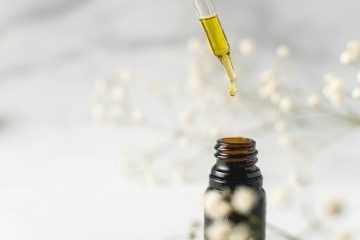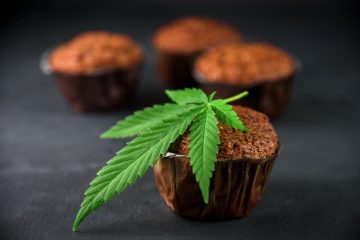Cannabidiol tincture is an alcohol-based, non-addictive solution that helps to provide relief for a variety of conditions. It’s used to treat chronic pain, nausea, headaches, anxiety, depression, and insomnia, among other conditions. The solution is often administered through a dropper or vape pen.
What is a CBD Tincture?
A CBD tincture is a liquid extract made from cannabidiol (CBD) oil, which is a non-psychoactive compound found in the hemp plant. CBD tinctures are usually made by combining CBD oil with a carrier oil, such as MCT oil or hemp seed oil, and are typically taken orally.
CBD tinctures are often used to help with a variety of health concerns, including anxiety, chronic pain, inflammation, and sleep disorders. They are available in a variety of flavors and strengths and can be taken by themselves or added to food and drinks.
To use a CBD tincture, you typically place a few drops under your tongue and hold them there for a minute or two before swallowing. This allows the CBD to be absorbed directly into the bloodstream through the blood vessels in the mouth, which can help to increase its bioavailability and effectiveness.
CBD tinctures are generally considered safe and well-tolerated, although some people may experience side effects such as dizziness, dry mouth, or changes in appetite. It’s always a good idea to speak with a healthcare professional before using any new supplement or medication, including CBD tinctures.
Alcohol-based or alcohol-based solution
A CBD tincture is a concentrated solution containing plant extracts. Traditionally, tinctures are made by steeping plant material in alcohol for several weeks. Nowadays, the process is simplified by adding purified water to the mix. Typically, a tincture comes in a glass bottle with a dropper. While the alcohol-infused substance is most common, some manufacturers add MCT oil or other plant-derived substances. Regardless of the sourcing, it’s a well-rounded product that is useful for maintaining health and wellness.
Alcohol is a polar compound, meaning it is a solid at room temperature, but it can be flammable. As such, the extraction process is best carried out in a well-ventilated space. The result is a dark tar-like substance with a high concentration of cannabinoids. It’s not surprising that alcohol is one of the most popular solvents for cannabis extraction. Moreover, it is a versatile substance, allowing it to be used in a wide range of applications.
Ethanol is an excellent choice for many reasons. For starters, it’s easy to manufacture and use. Additionally, it’s not explosive, making it a safer alternative to hydrocarbon extraction systems. Also, it’s a good fit for smaller-scale cannabis processors. In addition, it can provide a variety of desired end products, from flavonoids to terpenes.
The aforementioned tincture is best consumed sublingually, although it can also be added to food or drink. Another notable atribute to the tincture is the alcohol-free variant, which is made with an MCT-like liquid. This is a particularly useful attribute because it reduces the risk of bacterial salubrity.
Of course, there are many CBD tinctures on the market. However, the most efficient and effective are those that utilize the most sophisticated techniques. These may include the traditional alcohol-infused tincture or the more modern CBD oil tincture. Generally, they are assembled in an airtight unit and left to soak in a controlled environment. Depending on the tincture manufacturer, the process may involve the aforementioned glycerin and vinegar, or more advanced techniques such as supercritical CO2 or carbon dioxide extraction. Besides, it’s not uncommon for manufacturers to supplement the aforementioned tincture with an assortment of other ingredients to boost the efficacy of the final product.
Non-addictive
The benefits of a non-addictive CBD tincture are many. Some of the positive effects include calming a stressed-out mind and reducing inflammation. It can also help people with anxiety or depression. However, not everyone will benefit from CBD. Those looking to make the switch should be aware of the negative side effects.
Studies have shown that CBD has some potential as a treatment for addiction. This compound seems to have the ability to alter specific stages of drug dependence, such as intoxication and relapse. But, the effects of CBD on other addictive substances, such as alcohol, are not yet known.
In the quest to identify the best possible remedy for opioid and cannabis addiction, researchers have sought to identify the most useful compounds that will reduce addiction while preventing relapse. While some promising research has been conducted, more studies are needed.
For example, there has been little to no research on the effects of CBD on alcohol consumption. Additionally, there is limited information about the effects of CBD on smoking. Although there have been reports that CBD has the potential to reduce the number of cigarettes that an active smoker consumes, there are no clear-cut studies.
Likewise, there is no one study that identifies the exact effect of CBD on opioid addiction. And while there have been reports of a decrease in the amount of cannabis that people smoke, there is no proof of how effective CBD is.
Other promising studies have found that CBD may have an anticonvulsant effect. Moreover, the compound may be able to increase the effectiveness of prescription drugs. Also, it appears that CBD may be a neuroprotective agent that may help protect nerve cells from injury and disease. Lastly, there are no clear-cut studies on the effects of CBD on other addictive behaviors, such as gambling.
As with any medication, you should talk to your doctor before starting a regimen. There are some potentially serious side effects, such as liver-related blood tests. A good rule of thumb is to avoid taking too much CBD. If you are interested in using CBD as a preventative measure, it may be prudent to start small.
Doesn’t get you high
Doesn’t get you high with a tincture? CBD does not produce the same euphoric effects as THC, and you’ll never experience a buzz. Instead, you’ll feel a relaxing, sedative effect. It may also help you improve attention problems and reduce joint pain.
Cannabidiol is a chemical compound found in marijuana plants, and it is legal in most states. However, it has not received as much attention as other cannabinoids. This has changed recently.
If you’re looking for a more convenient way to take cannabinoids, you may want to consider a tincture. These are available in a variety of ratios, which allow you to enjoy the effects of both THC and CBD. You can choose from a full spectrum tincture, which features a complete strain’s terpenes and compounds, or a non-psychoactive isolate.
You can find cannabis tinctures in both oil and alcohol-based forms. Unlike edibles, tinctures are odorless and can be used with any food or beverage. They are also sanitary because the dropper bottle does not come into contact with the mouth.
The amount of cannabinoids and terpenes in a tincture depends on the ratio, and you can adjust your dosage as needed. Those who want a more uplifting, clear-headed effect can opt for a tincture with a higher CBD-to-THC ratio. On the other hand, those who need a more sedative effect can go for one with a low CBD-to-THC ratio.
Many tinctures are made from hemp plants, which contain less THC and more CBD. However, they still contain some of the cannabinoid’s psychoactive properties. Some states have restrictions on the sale of tinctures that contain more than 0.3 percent THC. Luckily, most states are now allowing the sale of products that are made from hemp.
Because of this, it is important to check with a physician before taking a tincture with THC. While it is unlikely that you will get high with a tincture, it can raise your risk of harmful side effects.
Cannabis tinctures can be purchased in most state dispensaries. In addition, you can buy CBD-infused products nationwide.
Side effects
CBD tinctures are a new product that has come to prominence recently. They are a liquid solution of cannabidiol, which is one of the most widely used cannabinoids. Compared to edibles and oils, CBD tinctures are quicker-acting and more effective. However, they can have side effects.
One of the most common side effects of CBD tinctures is a dry mouth. This happens when the saliva glands are not producing enough saliva. If this occurs, you will be forced to drink more water to maintain proper hydration.
It is important to note that these side effects are mild. The majority of people taking CBD to experience only the most minor side effects. In fact, they tend to go away very quickly.
Unlike many other cannabinoids, CBD is not known to cause a “high”. Nevertheless, it has analgesic properties. These properties can help patients cope with pain, as well as reduce inflammation.
A CBD tincture can be taken sublingually or under the tongue. Because the tincture dissolves in liquid, it is easier for the body to absorb. You can also use the tincture topically. But remember to avoid taking it on an empty stomach.
When trying to get a handle on how much CBD you need, it’s best to start with a very small dose. For example, you might start with five drops. Once you’ve established how your body reacts to that, try increasing the dose by two or three drops at a time.
Taking CBD in larger amounts can interfere with the liver’s ability to process other medications. So, if you are currently taking other prescriptions, it’s a good idea to discuss your options with your doctor before taking CBD.
If you want to take CBD tincture, it’s a good idea to find a product that is made from a high-CBD/low-THC strain. This will maximize your ability to benefit from the compound’s health benefits while minimizing its psychedelic properties.
CBD tinctures are an excellent way to treat a wide range of physical ailments. Many of them contain synergistic therapeutic ingredients that work together to improve your health.


